Manchester United's 1999 treble xG breakdown: Arsenal, FA Cup semi-final replay
How would 1999 look in the 21st century? The Independent joined up with StatsBomb to analyse three key United games

Your support helps us to tell the story
From reproductive rights to climate change to Big Tech, The Independent is on the ground when the story is developing. Whether it's investigating the financials of Elon Musk's pro-Trump PAC or producing our latest documentary, 'The A Word', which shines a light on the American women fighting for reproductive rights, we know how important it is to parse out the facts from the messaging.
At such a critical moment in US history, we need reporters on the ground. Your donation allows us to keep sending journalists to speak to both sides of the story.
The Independent is trusted by Americans across the entire political spectrum. And unlike many other quality news outlets, we choose not to lock Americans out of our reporting and analysis with paywalls. We believe quality journalism should be available to everyone, paid for by those who can afford it.
Your support makes all the difference.20 years on, it remains the greatest single-season achievement in English football’s history. But what would Manchester United’s treble of 1999 look like under a 21st century microscope?
In partnership with StatsBomb, The Independent has analysed three key games in United’s run-in in the hope of offering fresh perspective and insight on an iconic team and a historic achievement.
First up, not only the most entertaining game of United’s season, but a bona fide modern classic: the FA Cup semi-final replay against Arsenal, won by Ryan Giggs’ spectacular extra-time goal.
~ ~ ~
Arsenal 1-2 Manchester United (aet)
FA Cup semi-final replay
14 April 1999
Villa Park, Birmingham
Match statistics
Click on the images to expand
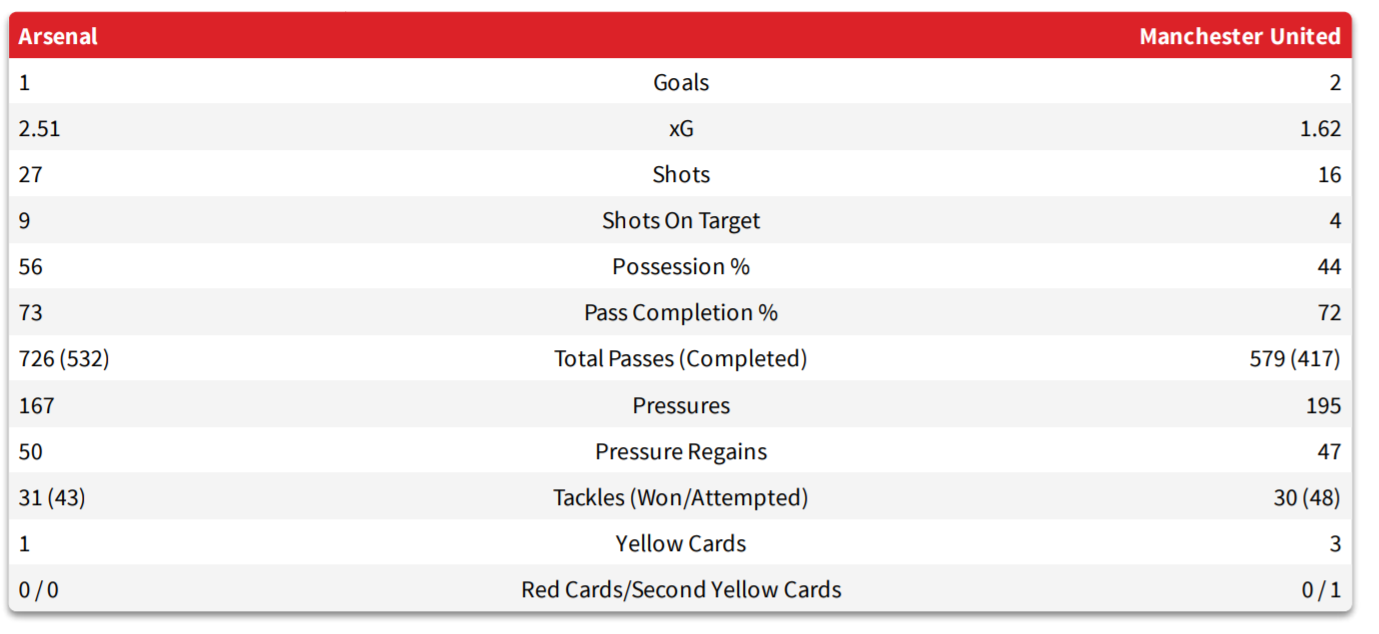
xG totals
As the graph shows, Arsenal ‘won’ the xG battle with 2.51 to United’s 1.62. This is a significant gap, enough for the model to predict that Arsenal would win and progress to Wembley 59 per cent of the time.
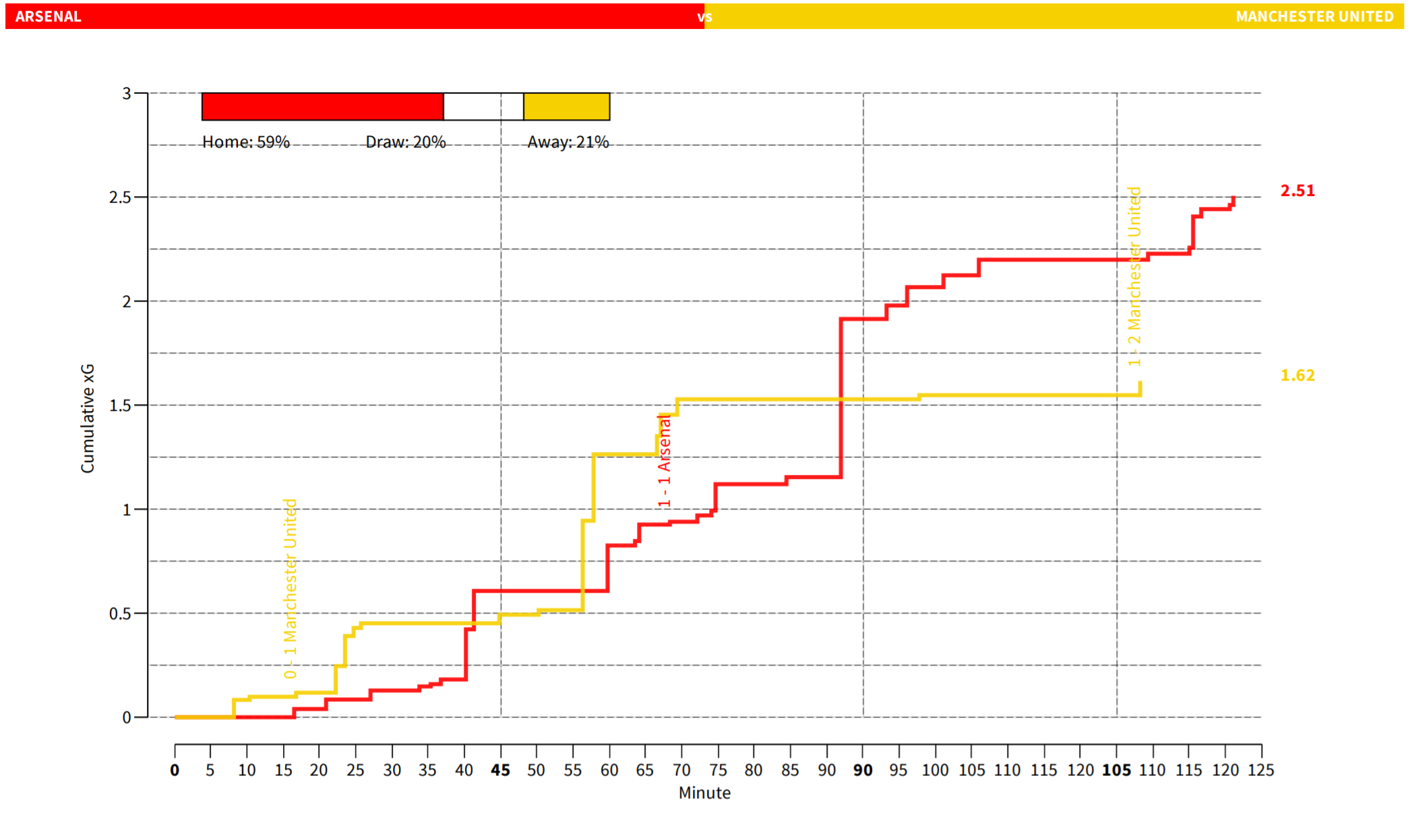
However, that difference between the two sides is largely accounted for by one moment – Dennis Bergkamp’s missed, 90th-minute penalty, worth 0.76 xG alone. Otherwise, this was a tightly-contested game of high-quality drama and low-quality chances.
Shot locations
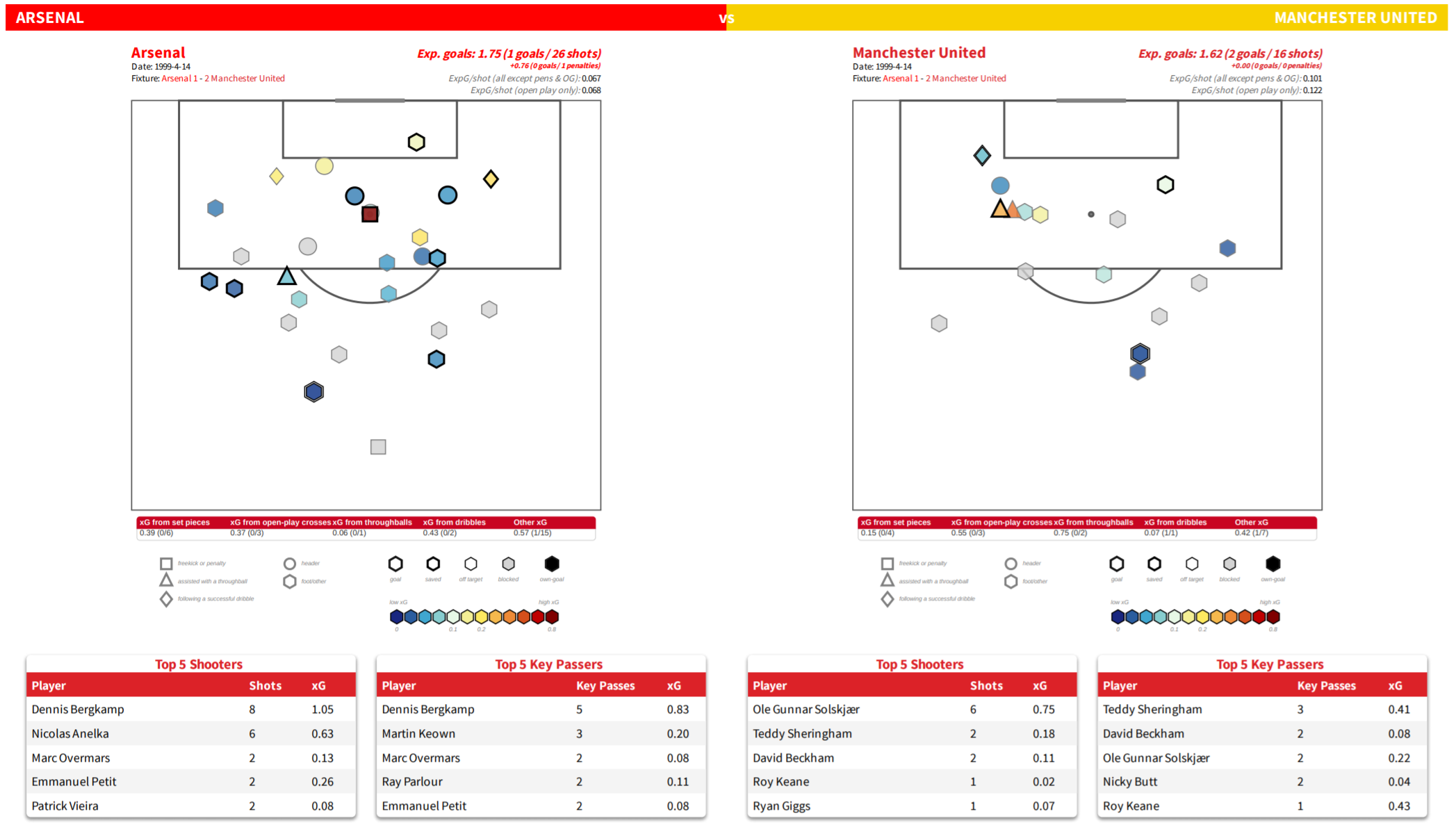
Bergkamp’s penalty was Arsenal’s best by some distance. No other shot at Peter Schmeichel’s goal registered more than 0.24 xG. Only Emmanuel Petit and Nicolas Anelka fashioned half-decent opportunities to score.
United had far fewer shots than Arsenal – 16 to their 27 – but the locations of their attempts were generally better and they found joy on the break. The best of their chances came in the second half, while still 1-0 up and in quick succession.
The first fell to Ole Gunnar Solskjaer, who beat Arsenal’s famous offside trap but put a 0.43 xG chance wide. Jesper Blomqvist hit a 0.32 opening at David Seaman soon after. Had either scored at that point, it would have been a very different, less memorable evening.
A look at the shot locations shows a high volume taken from outside the box by both sides. These were either blocked (grey) or low-quality (blue) attempts that stood little chance of producing a goal. And yet, two of them did.
Beckham’s goal
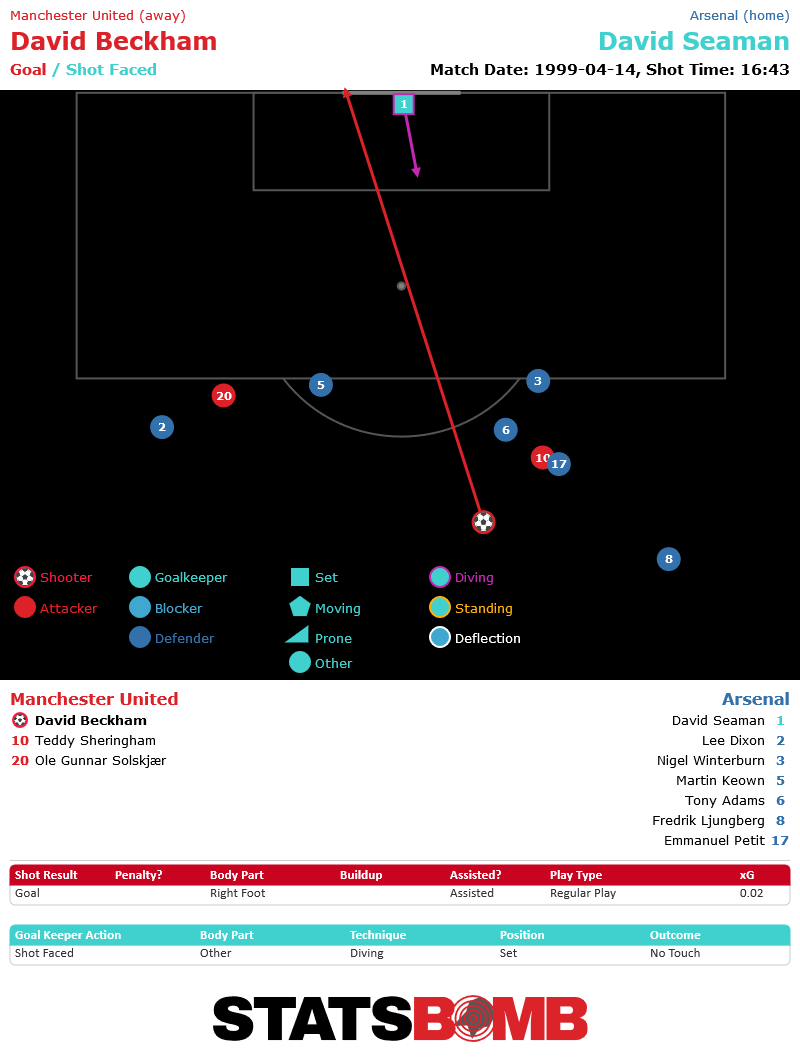
Take the opening goal, for example. The StatsBomb model ranks David Beckham’s shot from range of around 30 yards as a 0.02 xG chance – roughly the same value as Vincent Kompany’s recent wonder-goal against Leicester City.
And what’s more, the goal only comes about because Patrick Vieira fails with a 0.04 xG volley from long range seconds earlier. Peter Schmeichel collects Vieira’s shot, launches the ball back upfield and after a one-two with Teddy Sheringham, Beckham scores.
It is 30 seconds of football which sums up why this particular game is so fondly remembered and why we rarely see full-throttle, end-to-end contests between two teams shooting on sight 20 years later.
Fewer and fewer modern-day coaches would encourage Vieira’s audacious attempt because firstly, it stood little chance of coming off and secondly, it was more likely to leave Arsenal open to a quick counter.
Bergkamp’s penalty
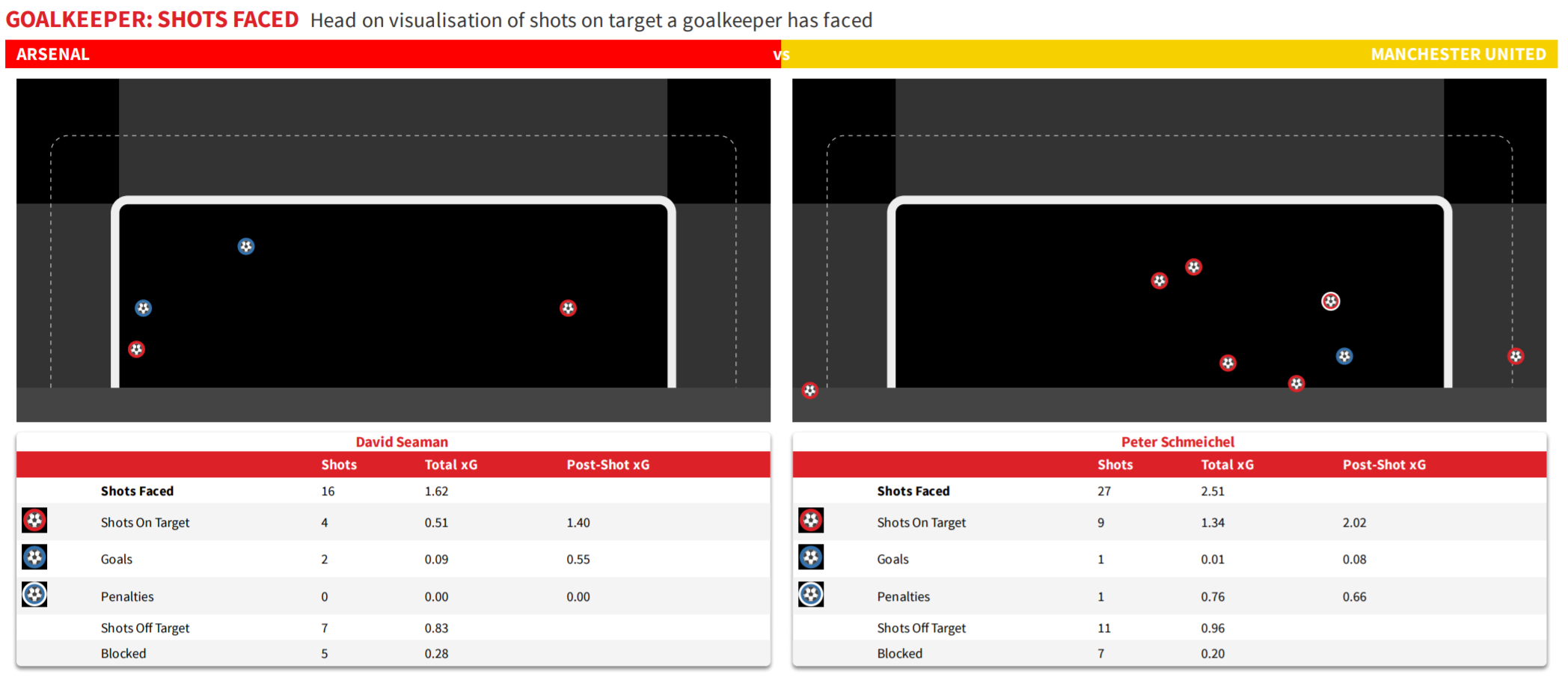
Of course, Arsenal would eventually equalise through a speculative attempt from range anyway.
Bergkamp’s equaliser – which was helped past Schmeichel by a deflection off Jaap Stam – would be scored around one in every 100 times according to StatsBomb’s model. It was even more unlikely than Beckham’s.
United were second-best from thereon, even before being reduced to 10 men. Sir Alex Ferguson’s side failed to add significantly to their cumulative xG, while Arsenal chipped away, looking for the breakthrough to finish their tiring rivals off.
The chance came in the 92nd minute, when Phil Neville brought Ray Parlour down inside the penalty area. But Bergkamp’s spot-kick was placed in the centre-right of the goal, several yards shy of the corner, and at a comfortable height for Schmeichel.
A penalty is valued at 0.76 xG, as around three-quarters of penalties are scored. Post-shot xG, which measures what happens after the ball leaves a player’s foot, values Bergkamp’s attempt at 0.66 xG. In other words, less than average. It was the last Bergkamp ever took.
Giggs’ winner
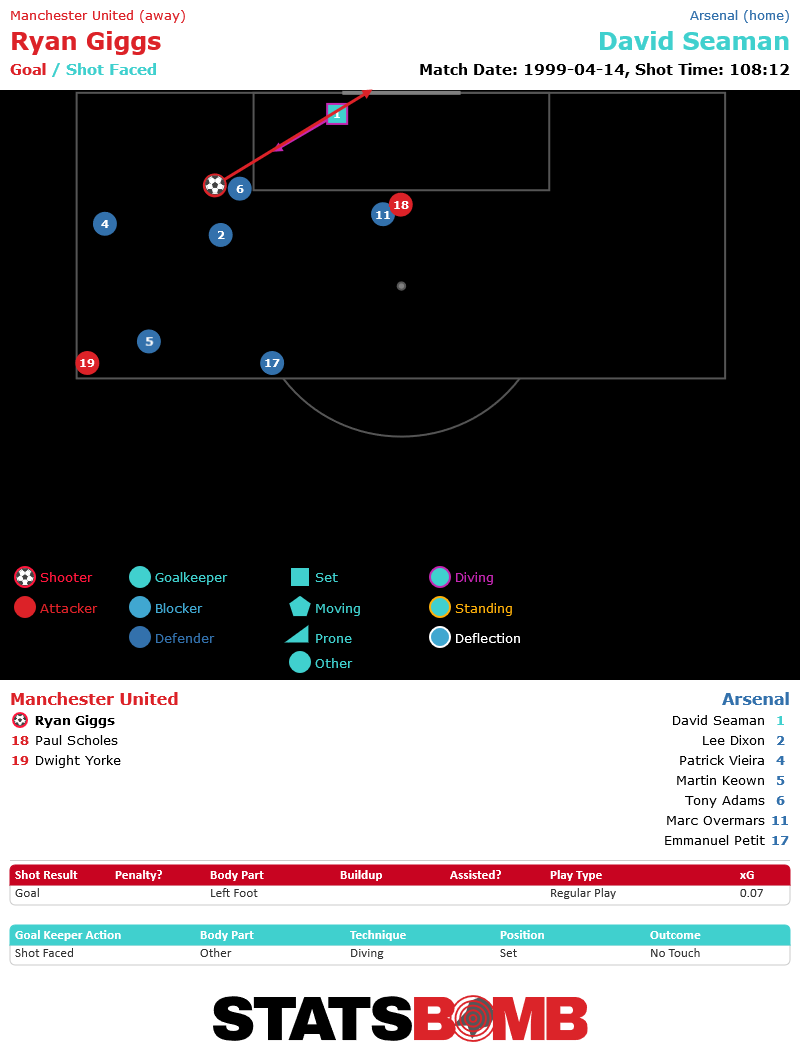
The most iconic moment was still to come, of course. Giggs’ winning goal – one of the greatest in FA Cup history – was an extremely difficult one to score, even after beating four Arsenal players on a run which started inside his own half.
Having surged past Vieira, Martin Keown and Lee Dixon, Giggs finds himself in quite an unfavourable position. Even when this close in, scoring from a tight angle is hard. It is harder still after a long, mazy run at pace through English football’s meanest defence.
What’s more, Giggs is up against a goalkeeper in Seaman whose feet are set and who is narrowing the angle. Seaman leaves very little space between himself and his near post. Tony Adams is charging across too, ready to slide and block.
All these factors contribute to a surprisingly low xG value of 0.07 on Giggs’ shot, but perhaps that is only surprising because we all know what happens next. Seaman stops him from going either side, the pass in the centre to Paul Scholes is blocked off, so Giggs decides to go over the top.
Verdict
Two decades on, the most striking thing to note from this game’s underlying numbers is how both sides – despite being packed with quality and committed to fast, counter-attacking football – struggled to create many clear-cut chances.
And yet, even so, there were three goals, a missed penalty and no less than 43 shots. Of those three goals, two were scored from outside the box. The third started in the player’s own half and ended at an inauspicious angle.
The statistical likelihood of one of those three goals being scored is small, let alone all three. That, ultimately, is why this is remembered as the greatest instalment of one of English football’s greatest rivalries and a key moment in United’s treble success.

StatsBomb is a football analytics company. You can visit their website or follow StatsBomb on Twitter.
Next up: Manchester United 2-0 Newcastle United, 1999 FA Cup final
Join our commenting forum
Join thought-provoking conversations, follow other Independent readers and see their replies
Comments